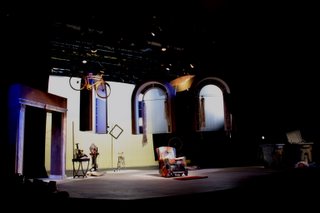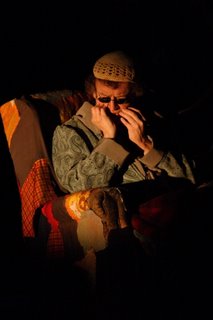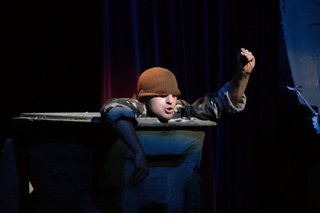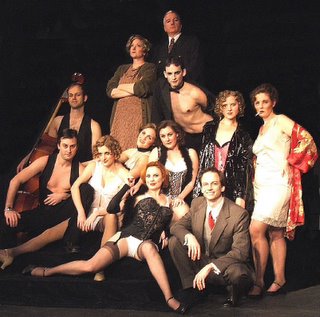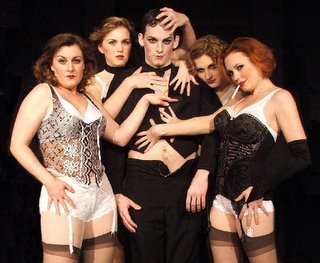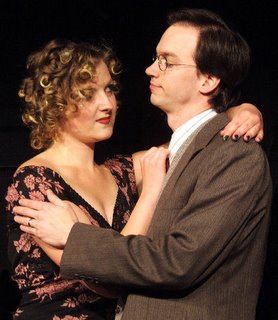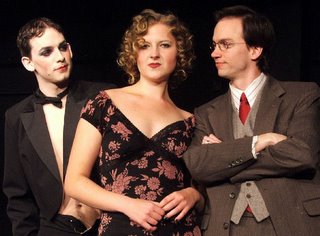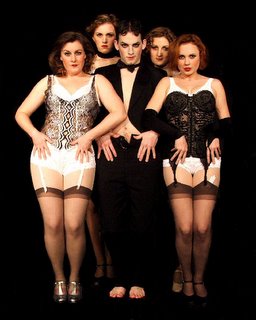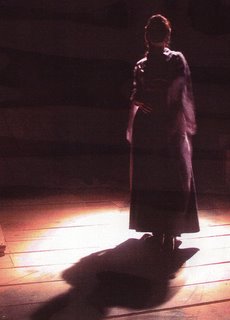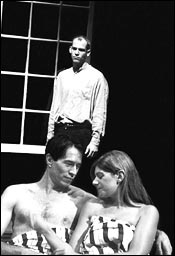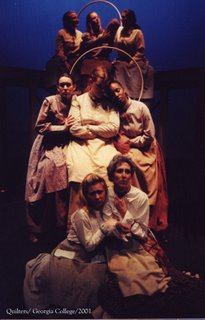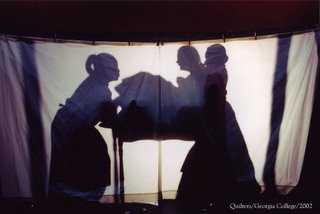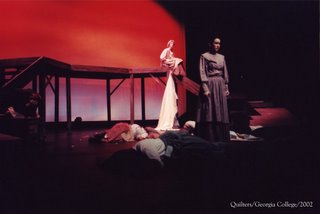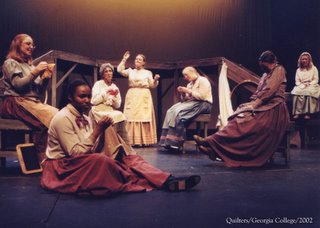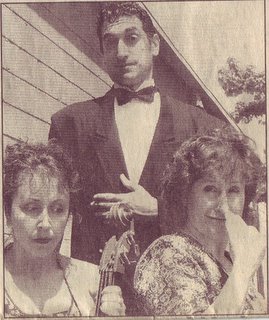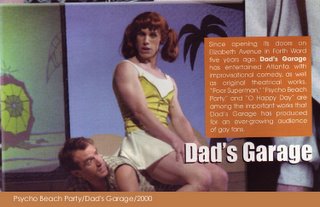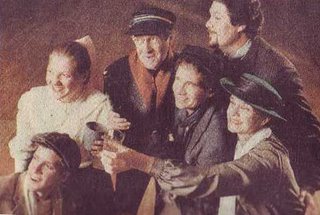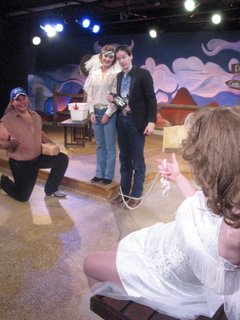Jane Eyre
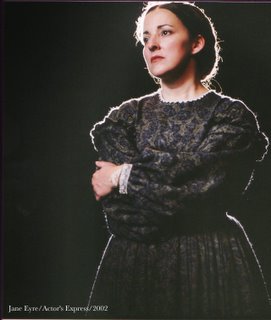 Atlanta Journal-Constitution, The (GA)
Atlanta Journal-Constitution, The (GA)from THE ATLANTA JOURNAL CONSTITUTION
November 22, 2002
Section: Preview
Edition: Home; The Atlanta Journal-Constitution
THEATER: A fine display of gothic gumption
WENDELL BROCK; Staff
REVIEW
"Jane Eyre"
8 p.m. Thursdays-Saturdays; 5 p.m. Dec. 1, 8 and 22; 2 p.m. Sunday and Dec. 15. Through Dec. 21. $20-$25. Actor's Express, 887 W. Marietta St. N.W. 404-607-7469, www.actorsexpress.com
The verdict: Book it
In the famous Branwell Bronte painting of his three sisters, Charlotte Bronte (1816-1855) is the one standing off to the side, looking decidedly like a plain Jane. By all accounts, she was. And it was this self-image -- too shy, too short, too smart maybe -- that led to the creation of her alter ego, Jane Eyre.If you don't know her novel of that name, it's one of the grandmamas of Gothic fiction, a fetid tangle of abandoned orphans, mean-spirited aunts, wounded romantics and madwomen locked in the attic. Though it may be a laughable melodrama by contemporary standards, the book has been perennially admired as everything from an early feminist manifesto to a classic novel of marriage -- and it's easy to see how the story has influenced pulp practitioners and A-list stylists alike. (See Henry James' "The Turn of the Screw" and Edith Wharton's "Ethan Frome.")
Now Actor's Express has staged a theatrical alternative to the book itself. It comes courtesy of adaptor Julie Beckman and Seattle's Book-It Repertory Theatre -- a company of literary lapidaries with a reputation for carving sprawling works of fiction into dramatic gems. Instead of reading the 500-page novel, you can sit through the nearly three-hour drama, which is faithful down to the period costumes and fuzzy sideburns and even preserves Bronte's descriptions of her characters' every eyebrow wiggle.
This is not a fault -- just a device that adds to the sensation that you are reading the book as it's acted out in front of you. Over the past year, I've seen it applied to varying effect to the works of Flannery O'Connor, Charles Dickens and C.S. Lewis. Sometimes the actors sit in chairs, sometimes they stand behind lecterns, and sometimes -- as in David Crowe's finely detailed production here -- they engage in performances that fairly pulsate with energy and emotion.
Caveats first: Though mostly successful, this "Jane Eyre" is too long. And Agnes Lucinda Harty's portrayal of the strong-willed heroine turns her into a one-note Janey, who's probably more maudlin than she needs to be. We feel sympathy for Jane when we should, but we probably smile a bit more than we ought when she has to submit to the campy cruelties of human nature. It's the "What Ever Happened to Baby Jane?" syndrome.
As Edward Rochester -- the rich, handsome hero who makes her fall in love with him, as she puts it -- Seattle actor Basil Harris is sufficiently dark-eyed and mysterious to make his character totter on the edge of goodness and evil. Technically adept, he also gives a quicksilver impersonation of Rochester's horse, riding in from the woods.
Just as delightful are ensemble members Barbara Cole, Andrew Davis and Jackie Prucha in so many guises that you're surprised there aren't more of them when they take their bows.
As the coquettish Blanche Ingram, Cole is in her most glamorous Bette Davis mode. Prucha's primness of face gives her a formidable edge as Jane's hateful aunt, Mrs. Reed. And Davis, as the sadistic Mr. Brocklehurst and the parsimonious postmistress, is sublime. Like Dickens, Eyre had an eye for the grotesque, and this production finds great comedy in the caricatures..
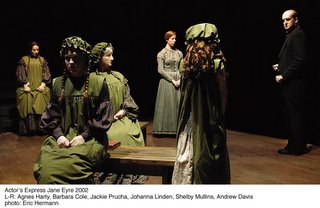
Miranda Hoffman's sets and costumes give this sparingly staged composition the right tone. Enhanced by Juliet Chia's burnished lighting, Hoffman's silhouettes are evocative of great portraiture -- from Ingres to Degas to Sargent.
This painterly effect reaches a theatrical apotheosis in the Christmas ball scene, in which a party of revelers pantomime their happiness while Jane looks on in horror. Instead of falling back on the tired balletic conventions of whispered acting, Crowe blurs the action of each vignette with the hand of a slow-motion photographer. The results are mesmerizing, beautiful and pregnant with psychology.
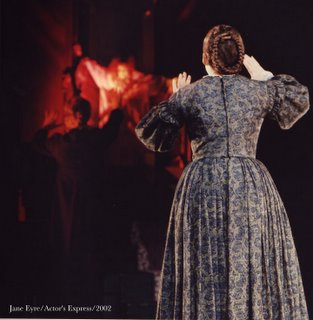
Of course, so is the source. How clever of Actor's Express to produce a dark holiday alternative to Dickens. Like "A Christmas Carol," this show is creepy, ultimately transcendant and English to the hilt. Bitters with wassail? Works for me.
Photo: In Actor's Express' moody and masterly staging of "Jane Eyre," Basil Harris as Rochester and Agnes Lucinda Harty as the strong-willed governess are commendably credible. / YVETTE ZAROD / Actor's Express
Copyright 2002 The Atlanta Journal-Constitution
from CREATIVE LOAFING
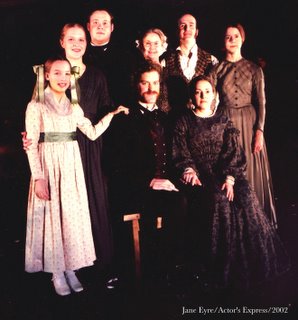
Fresh Eyre
Jane Eyre brings lit class to life at Actor's Express
BY CURT HOLMAN
Seeing the Actor's Express production of Jane Eyre is the next best thing to reading Charlotte Bronte's book. Julie M. Beckman originally adapted the novel for Book-It Repertory Theatre in Seattle, which specializes in bringing classic texts to the stage. If Jane Eyre is a representative page from its work, the company has found the ideal key to combining the richness of reading with the dynamics of stagecraft.
The story of Jane Eyre is well known, or at least it should be. Agnes Harty plays the title character, an orphan girl raised by the severe Mrs. Reed (Jackie Prucha) and other unloving relatives. At boarding school she survives both corporal punishment and an outbreak of typhus, the deaths from which are hauntingly symbolized by white sheets spread over the spare stage floor.
Jane eventually strikes out on her own as a governess, finding a job at an underpopulated mansion called Thornfield Hall. She's attracted to smoldering Mr. Rochester (Basil Harris), the master of the house, but feels like a low-born outsider in company of such society friends as Barbara Cole's wicked aristocrat.
She also wonders why things go bump in the night at Thornfield Hall, as she hears maniacal laughter and catches glimpses of a strange, wild-haired figure. Director David Crowe makes effective use of shadows, candles and light reflected from hand-mirrors to create a moody atmosphere. Only the moments of actual violence, which are conveyed in slow-motion and drastic lighting changes, prove awkward.
Given the gothic setting and actors playing multiple roles, Jane Eyre favors the two-actor Taming of the Shrew, which starred Harty and was staged by both Actor's Express and the Shakespeare Tavern. But Beckman's script stands apart by retaining huge passages from Bronte's text. Jane Eyre is a first-person novel, and Harty is required to speak nearly non-stop for more than two-and-a-half hours, but her energy seldom flags.
The quirky thing about Beckman's device is that the other actors speak not only the dialogue but descriptions of their characters' actions, with speaking parts switching actors in mid-sentence. Andrew Davis' oppressive Mr. Brocklehurst says, "He turned his head slowly..." "... toward where I stood," Jane finishes. At some moments it's like the actors are merely reciting unnecessary stage directions: "Bessie brought in a glass of water," says the actress playing Bessie, bringing in a glass of water. But as you grow accustomed to the gimmick, you can appreciate the shadings the actors bring to Bronte's prose. Jane Eyre takes a condensed version of the book and sets it in motion.
Despite the ominous goings-on, the production finds room for laughter. Male actors occasionally play female parts, with Davis portraying an elderly postmistress with a hacking cough, and subsequent references to the post office are punctuated with his cough from off-stage. And Harris captures not just the brooding, tortured Rochester but the charm of the role, especially in the moments when he flirtatiously accuses Jane of being a fairytale creature.
Even while enjoying the first act, you might find yourself asking, "Why Jane Eyre? The gothic setting, however well handled, could come from plenty of other sources, and a book like The Scarlet Letter might seem more relevant to current issues. But Jane Eyre's immediacy asserts itself in the latter half. As an "independent" woman, the title character emerges as a kind of proto-feminist, while Rochester's dark secret, represented by the sinister locked door that commands the performing space, can stand for anyone with a skeleton in the closet -- or a madwoman in the attic.
And Jane Eyre still has the capacity to surprise. On opening night, someone in the audience gasped audibly at a second-act plot twist. There's life in the old book yet.
curt.holman@creativeloafing.com
